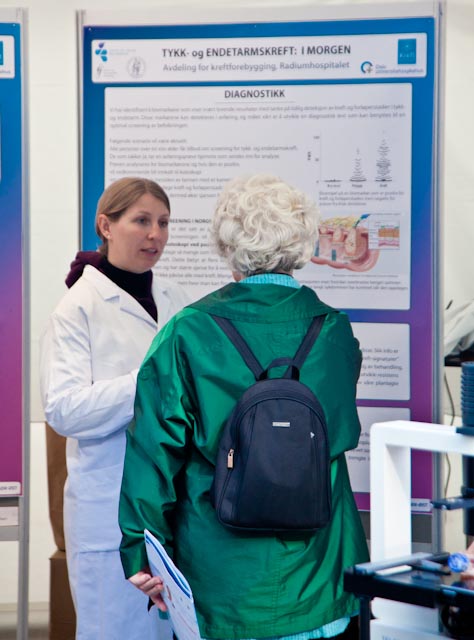British biotech company signs agreement with Inven2 to secure exclusive rights to biomarkers identified in the Lothe group

The 8th of February 2012 Inven2, the Hospital’s technology transfer office (TTO), signed a licensing agreement with Oxford Gene Technology (OGT) on behalf of the Hospital and the inventors at Department of Cancer Prevention, Guro E. Lind, Rolf I. Skotheim, Terje Ahlquist, Kim Andresen, Deeqa Ahmed, and Ragnhild A. Lothe. OGT will develop a non-invasive test for early detection of colorectal cancer based on biomarkers from two separate patent applications. It is years of research in the Lothe group with senior researcher Guro Elisabeth Lind leading the daily work that has led to this important milestone. Dr Lind and co-workers have validated the biomarkers in more than 500 patient samples and shown a high sensitivity and specificity for colorectal cancers as well as benign lesions.
Colorectal cancer is one of the most frequent cancer types in both men and women and more than 3600 new diagnoses are made annually in Norway alone. Less than 60% of the patients are still alive after 5 years. The survival rate is highly dependent on how advanced the cancer is at the time of diagnosis. Detection at an early stage indicates curation by surgery alone.
The only non-invasive screening test shown to cause reduced mortality from colorectal cancer is the fecal occult blood test (FOBT), which is prone to miss positive cases (limited sensitivity) and to produce false positives (limited specificity). The new biomarkers have a both sensitivity and specificity of more than 90% for colorectal cancer tissue samples. Dr Lind and co-workers received the Medinnova idea prize for the best idea with commercial potential in 2007, and since then, the lab has been working with validating the original findings in an independent clinical sample series as well as improving the methodology and optimizing the markers further with the aim of developing a non-invasive test based on fecal and/or blood samples.
 |
| "This dedicated and goal oriented work awarded with a licensing agreement with OGT, has been achieved due to the exceptional lab skills, stayer ability and high spirit of Guro Lind" says the dept head, Prof Lothe. |
Mike Evans, CEO in OGT says: “We believe that developing tests that include these genetic markers will permit the earlier identification of patients at risk of this disease and allow for more timely diagnosis and clinical interventions.” He added, “The higher specificity of this new panel of markers could provide a more robust screening tool than the tests currently used, while eventually lowering overall costs, which would be of significant benefit for both patients and the clinicians using them.”
OGT is a diagnostic company founded by Sir Edwin Southern – the father of the Southern Blot methodology. OGT is a provider of innovative clinical genetics and diagnostic solutions to advance molecular medicine
Links:
Oxford Gene Technology
OGT – press release
GenomeWeb News
Guro E. Linds' publications
Ragnhild A. Lothes group - Molecular genetics
Department of Cancer Prevention
Centre for Cancer Biomedicine
Scientific articles leading up to the new biomarkers
Lind GE, Kleivi K, Meling GI, Teixeira MR, Espen Thiis-Evensen, Rognum TO, Lothe RA. ADAMTS1, CRABP1, and NR3C1 identified as epigenetically deregulated genes in colorectal tumorigenesis. Cell. Oncol., 28: 259-272, 2006
Lind GE, Ahlquist T, Lothe RA. DNA hypermethylation of MAL – a promising diagnostic biomarker for colorectal tumors. Gastroenterology, 132: 1631-1632, 2007
Lind GE, Ahlquist T, Kolberg M, Berg M, Eknæs M, Alonso MA, Kallioniemi A, Meling GI, Thiis-Evensen E, Rognum TO, Lothe RA. Hypermethylated MAL – a silent marker of early colon tumorigenesis. J Translational Medicine (BMC, Flagged as “Highly accessed”), 6: 13, 2008
Ahlquist T, Lind GE, Skotheim RI, Meling GI, Vatn M, Hoff GE, Rognum TO, Thiis-Evensen E, Lothe RA. Gene methylation profiles of normal mucosa, and benign and malignant colorectal tumors identify early onset markers. Mol Cancer (BMC Flagged as “Highly accessed”), 7: 94, 2008
Lind, GE, Raiborg C, Danielsen SA, Rognum TO, Thiis-Evensen E, Nesbakken A, Stenmark H, Lothe RA. SPG20, a novel biomarker for early detection of colorectal cancer, encodes a regulator of cytokinesis. Oncogene, 30: 3967-3978, 2011
Lind GE, Danielsen SA, Ahlquist T, Merok MA, Andresen K, Skotheim RI, Hektoen M, Rognum TO, Meling GI, Hoff G, Bretthauer M, Thiis-Evensen E, Nesbakken A, Lothe RA. Identification of an epigenetic biomarker panel with high sensitivity and specificity for colorectal cancer and adenomas. Mol Cancer (BMC flagged as: “highly accessed”), 10(1): 85, 2011
